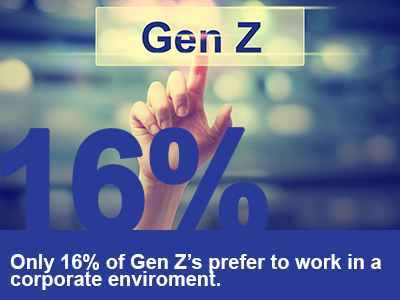
By Keisha Ward, courtesy SBAM Approved Partner ASE
We now understand and have embraced the vast workplace changes experienced by the millennial generation, arguably the most workforce altering generation yet. We will have an opportunity to offer a fair analysis as we prepare for the entrance of a new generation of tech savvy, independent, free spirited individuals. It is now time for organizations to shift gears and focus attention on a rapidly approaching game changer called Generation Z (Gen Z).
With millennials turning 40 and moving into leadership roles, they have opened the doors to a new, unique workforce. Like generations past, Gen Z has dynamic skills that will be vital to all organizations. Gen Z consists of the those born in 1995-2010. Although this timeframe may seem like yesterday to some, the group that has never used a payphone, landline, or even experienced life without the internet or a cellphone will be graduating college and highly sought after by organizations in two to three years – if not sooner. Many Gen Z’s prefer on-demand training rather than incurring college debt like their predecessors.
Contrary to popular belief, Gen Z is not an extreme version of the Millennial generation. There are similarities between the two generations such as their level of technical inclination; however, it turns out that Gen Z has a combined style that is similar to Gen X (their parents) and millennials. According to studies, when it comes to their job search this group – like Gen X, prefers networking and physical interactions rather than virtual dealings. They have witnessed a great deal of uncertainty in their time and as a result they lean toward stability, yet they are highly independent and will not be confined to one space for an entire workday/work week. A survey by Randstad found that while 46% of millennials would prefer to work in a corporate environment, only 16% of Gen Z would agree. So how should companies prepare for this workforce?
This generation is said to welcome traditional hiring practices and prefer to seek jobs via company websites, word of mouth, and even job fairs. Spark Hire suggests the following ways to prepare:
Start experimenting now. There are several candidates available and looking for work from this group (again, many have opted against attending college). Start reaching out to them to learn what works.
Speak their tech-savvy language. Engage this candidate group by showing them that you speak their language. Share examples of how your organization is able to connect at their level, technically.
Embrace their independence. Offer training and developmental programs. Inform them of how their skills will be used in other areas of the organization.
Understand how they select their roles in an organization. Millennials set the tone and provided recruiters an opportunity to develop a playbook on quickly learning how to engage and attract a new generation of candidates. This time around, hiring teams will need to understand the differences in this group and flex with their needs. They may not have the degree; however, they can quickly absorb new information and contribute professionally. They will need to be allowed to freely utilize their creative abilities. Leaders should to be prepared to offer these individuals challenges and be willing to step aside and allow them to work through processes in a way that is best for them.